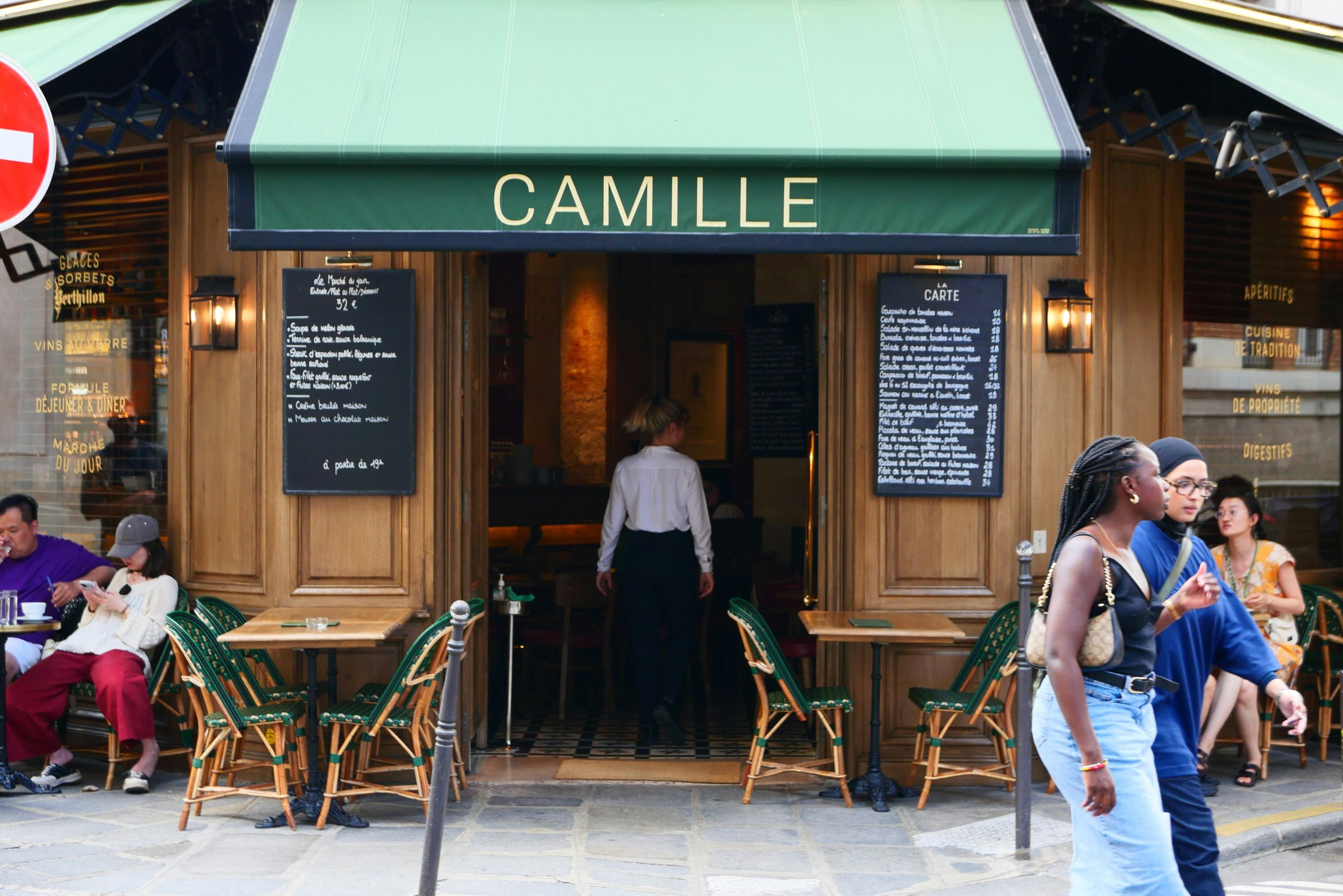I Was a Waitress by Samantha Allan
Greta had a powerful stare. Approaching her with a platter of eggs, I imagined that her steady eyes were going to raze me until I was nothing more than a pile of wood shavings. The force of my transformation would send up a fine sawdust that shimmered in the light from the window behind her table. I wanted to be looked at but not like this, that is, not until I realized that I was supposed to stare back. She wanted to get to know me. And she succeeded in teaching me how little I liked eye-contact, how frightening it could be, until you decided to meet it head on. I came to like Greta, look for her. She softened the longer I met her gaze.
I say I miss food service and my friend May looks at me like I’ve lost it.
I say I miss food service and my friend May looks at me like I’ve lost it. “You don’t remember,” she says, shaking a sugar packet into her coffee at our favorite diner in Austin, a hole in the wall that is deliciously un-instagrammable and crammed with others who crave its faded upholstery and dated green glassware. She’s probably right. Miraculously, my body has forgotten the dispassionate questions—“and on the side would you like”—the tense waiting game between kitchen and hungry businessmen, the backache at the end of each day, even though my mind remembers. My body only remembers a constant state of flow.
In my apron, halved at the waist, packed with straws, it was as though a waterlog broke inside my ears, leaving a clarity through which I could appreciate that I was living in the world. I was in a place that thrummed, and I thrummed, too. Ten years later, in my first office, where I design HR training videos for companies in Central Texas, there is no flow and no world. I don’t know how else to explain it. I float in constant worldlessness. I try to remind myself what a luxury it is. Meanwhile, my mind encourages my hand to pantomime the lever of a phantom espresso machine.
May suggests that I am probably not getting enough exercise. She is a good friend and she is probably right. But something about running, which I love in the abstract way we love things that have gone fallow, does not capture the whole feeling I am yearning for. Inside the feeling is a ringing telephone with a distinctive bleat. Inside the feeling is a pair of elderly women who eat breakfast together every Saturday and order the same omelets. Inside the feeling is even the day that one of them comes alone, bravely, to see if she can say goodbye to a tradition spanning years, and we all know what happened.
Gwendolyn Brooks writes: “but World… / wants to be Told.” The slant rhyme is achingly beautiful: life will never translate perfectly into story. In my pristine void, shielded from “the public,” I think about how ardently Told wants World, too. Writing has gone the way of running. I want to love it again, but I am too hungry for the feral stories that live in the wild, the kind you have to witness with your own wrists resting on a bar top.
If you have ever worked in food service, you most likely know how to hate a place and love it at the same time.
When I moved to Austin for graduate school, which felt like my forever-departure from the purgatory of food service, I reconnected with an old friend who was trying to make a living as an artist. “How do I make enough money to live but also make art?” she asked, and I didn’t know. I had given up on that question. She started gigging as a circus performer at parties, swallowing swords, juggling fire, swimming through hotel pools in a hot pink mermaid tail. Satisfied hosts left her Google reviews, and suddenly, it seemed as though she had an event to perform for every night. To my mind, she had cracked it. There was so much world inside her world. I did not know how to eat a machete but I wanted so badly to see if there was something I, too, could do to increase the time I spent talking with strangers. It was this capacity for interaction, more than the glamour, that drew me in. I wanted to escape the banality of office life for what some would consider an equally banal alternative: one that would include children and the elderly, that could engage my body, and that could quench my thirst for social novelty.
My first waitressing gig was at a place called Cici’s Café. Tucked into a strip mall in Los Angeles’s San Fernando Valley, Cici’s had a cult-following, summoning two-hour lines on weekends as seamlessly as a magician pulling a stream of handkerchiefs out of a hat. There were no reservations. People would wait in pouring rain or scorching heat, and inside, choose a reward for their patience from a twenty-page menu, laminated pages strung together with faux-leather string, mostly of novelty pancakes.
If you have ever worked in food service, you most likely know how to hate a place and love it at the same time. At Cici’s Café, we hated the people who made our jobs harder and loved that complaining about them made us a “we.” Courting regulars made us a “we,” too; a porous “we” that could welcome the people who treated us like people into a common fold.
Cici’s is where I met Greta. I also met Elena, a woman with a tremor in her hands who sat at the bar twice a week and tried a new plate of pancakes every time she visited. Once the green-tea tiramisu; once the strawberry cheesecake; the next our wildly underrated hotcakes drizzled with fresh corn and honey. Over the course of several months, she fed me and the rest of the bar-crew details about her life in exchange for decaf coffee refills. One day she asked me if I would be interested in ghost-writing her memoir. “I like the way you speak,” she said. “Maybe you could make sense of it all.” Elena had been adopted from an orphanage in Greece by American parents. She never knew her birth mother, but had grown up taut between the desire to find her and the desire to remain unknown. “Maybe,” she said, “I want her to find me so that I can decide whether to know her, so that it feels like the ball is finally in my court.” I never wrote Elena’s memoir. She decided one day, with fervor and without explanation, that it would be a terrible idea, and never brought it up again.
Countless other regulars and one-time customers joined Elena, almost everyone transformed by the talismanic power of the barista counter into a person ready to share something personal, a phenomenon I had thought only existed on Cheers. A man of indeterminant age with rough skin and young eyes who made leather vests for a living; a woman and her daughter with the same chin, home from college; shy first dates and old friends reconnecting tentatively after growing apart; a woman who was always ready to travel somewhere new, always alone. Then there was that sprinkling of Twilight Zone the universe reserves for restaurants: someone sits down for coffee, weeps profusely, and leaves you fifty dollars. Someone leaves you their number and uses an uneaten hard-boiled egg from their salad as a paperweight. A group of three cuts their own hair at the table and leave you the trimmings.
Back of house, I befriended a line cook named Arturo who commuted two hours to work from Bakersfield. Depending on traffic, it could take two and a half hours for him to reach home. The cost of commuting was cheaper than the cost of finding a place to live for himself, his wife, and his children anywhere in Los Angeles. Arturo had a thoughtful way of speaking and a smile that would put most movie stars to shame. He was so kind to me and everyone else that I found myself wondering how he spent his daily eternities on the road. How could someone possibly be that composed every day without breaking down? I suspected the answer would reveal the naiveté of the question: we don’t always have a choice.
A prep cook named Ryan, who we all knew was a Chippendale dancer on Friday nights—that was all we knew—once came into the smoking patio from the parking lot holding a live pigeon, bare palm against its chest. “It fell from a tree,” he said, with all the nonchalance of a man holding a football he had found outside a school yard. He wanted to know if someone had time to take it to the animal hospital. I grew up with a mother who could not bear the suffering of animals, and leapt to the task with Pavlovian speed. Ryan helped me swaddle the bird with dish towels and pack it into a fruit crate. “It’s like you do this all the time,” I joked, and he said, with utmost seriousness, “I do.” I hurdled down the freeway with the bird blinking slowly in its makeshift car seat, praying I would reach the rescue ward in time. A vet tech would tell me he was going to take the bird to a warming plate, and suggest I keep my expectations low. I would call the next day to leave a message. I would never hear back.
I don’t know why I miss this special variety of heartbreak. All I can offer is that sometimes the point of a story isn’t how it ends.
My office is on the twelfth floor of a mixed-purpose building with thirteen floors and has a spacious window, which I inherited as a fluke when my senior coworker resigned, and which I am ashamed I do not appreciate. On good days, I can pretend my videos are not so different from the teaching work I performed at the university where I was an English PhD student, a career I also loved, but that brought with it a daunting job market and eventually herded me to this desk in search of a regular schedule, a guaranteed paycheck, and a way to stay anchored to the city I called home. Beyond the window, there is a balcony that you can only access through a locked door, now permanently shut to all employees due to an incident that has escaped the rumor mill’s memory. Birds visit the metal railing sometimes: the vultures and hawks who dominate high altitudes, the sparrows who remind me that I am not so far above the ground. Mostly, they arc soundlessly across the thin sky and seem too majestic to fall, but I know that if one did, someone would witness it. And I know it is at least possible that someone would do their best to intervene.
In The Queer Art of Failure, Judith Halberstam argues that many of the acts we perceive as “failure” are actually a failure to meet capitalist, patriarchal standards for success: finding a partner of the opposite sex, producing children, accumulating wealth and property. There are few arguments more appealing to someone looking to make sense of how consistently they seemed to have dropped the ball. What if, Halberstam asks, we were to “imagine new versions of maturation, Bildung, and growth that do not depend upon the logic of succession and success”? What do we learn from “practicing failure,” which can lead us “to discover our inner dweeb, to be underachievers, to fall short, to get distracted, to take a detour”—and on that detour, find a true expression of what we really need? In this sense, the detour that some might perceive as failure is also a portal into a deeper, self-determined success.
Waitressing was the portal my heart traveled through to reach my sleeve. I went from a “quiet” girl to a girl who could not stop talking to strangers. I remember waking up, many days at six in the morning, and realizing that I was actually happy. It was important that the daily social interaction was also a vocation. It was not a pastime, but an act of service.
I would go on to perform other acts of service, such as being a teacher, but only food service lives in my body. For some people this would be—and is—horrifying. Maybe it would have been for me. Maybe because I grew up thinking my body did not matter and longing for something I could not name, lying in fetal position on the carpeted floor of my bedroom during the dog days of summer, waitressing introduced me to the sanctity of movement. I hadn’t realized my body could process my feelings; that if I turned off my ceaseless mind, a run of twenty drink orders could take me somewhere better. It was also a lesson in accepting little beginnings and little ends, hundreds happening over the course of a day. A crash course in developing a tolerance for mistakes. A meditation: to be a good waitress, that is, one whose soul does not break despite constant indignity, you cannot forget (orders, allergies, broken glass) but you have to move on. Somehow the work galvanized me in spite of the too-old men who stared at my chest, in spite of the manager who ripped a sandwich out of my hands during a stolen lunch break, in spite of the teenagers who dined, dashed, and left me paying their tab out of my tips because I had too many tables to catch them, in spite of every time I was yelled at, once so badly, I ran blurry-eyed into the parking lot to sob. How to explain that something could be treacherous, haunted by broken systems, and also revelatory, as though it made use of a vestigial limb?
I miss being in circulation, like a library book with a card full of names. I miss this act in the literal sense, too: circling a wide room with an urn full of coffee, locating empty cups. Whisking away empty plates. In my memory, the movement is noiseless and swift, a trapeze act. I sail through the sky of the day. I learn from the older waitresses to walk in worn-out athletic shoes like I wear combat boots, to talk back to rude customers during a lunch rush like I’m kicking open a door, to smile big for tips if I feel like it and frown through a shift without apology if I don’t. I learn to ask questions that get cagey bar flies talking, to recognize the difference between loneliness and solitude, and to use an alias if someone sour asks me for my name.
A coworker once shared with me that in her view, servers—especially women and femmes—witness a component of adult psychology that few other professions draw out. When people are hungry, she said, and they are sitting, and you are standing above them, and you are waiting on them but to the same extent, they are waiting for you, you enter a complicated power dynamic that smells parental. You become a channel—and a barrier—to being fed. Your customers can enter this dynamic restless, buying willfully into the promise of their control with an undercurrent of suspicion that they do not really have the upper-hand. I started to track this affect. Part of every irritated posture was a shoulder or an eye holding not only hunger or entitlement, but also fear.
Is there any act of professionalized caretaking that doesn’t also require the recipient’s vulnerability?
I still wonder: is there any act of professionalized caretaking that doesn’t also require the recipient’s vulnerability? Paying for someone to serve us in a world constricted by commerce allows us to enter the sacred act of trusting a stranger. The act is compromised: a credit card can insulate you. Still, it is possible to feel something older than money when someone’s hands comb your hair out of your face, or delicately paint each of your naked fingernails, or place a platter of scrambled eggs in front of your hunger. Years after I unknotted my apron and let it fall into the UPS box under the tip jar in my last restaurant for the last time, I want only to enter this act and stay inside it—to stir latent body-memories of kinship that capitalism, turning all it can into transaction, has attempted to bury. If this is failure, it is a failure I long to slip into, the way an actor can slip into a costume and become a truer version of themselves. Maybe, someone told me once, you miss food service because it represents a time of pure desire for all the things it wasn’t and that you had yet to become. A time of unrealized potential. I still think about this theory. It never rings true.
A waitress refills May’s coffee, and she hugs the cup with her hands. She loves this feeling, she says. The cup becomes warm from the inside like a rock in the sun, fits the pads of her fingers perfectly.
I tell May that I’m going to see a career counselor. I worry they will not sanction how badly I want to fail. I worry I will not be able to explain that making a living as an artist is, for me, as much about connecting with as many lives as possible as it is about putting food on the table. We will have to talk about things like health insurance and retirement plans. There are so many things that keep us just outside of the world so that we can still be tethered to it. I don’t know what it will feel like to fall back to earth, or how many detours await me there. All I know is that I no longer dream of going somewhere full of voices just to close a door.







